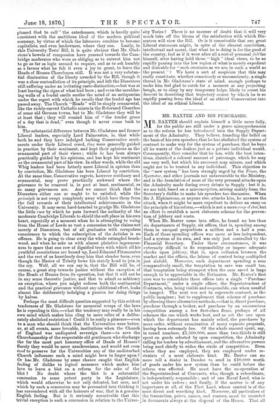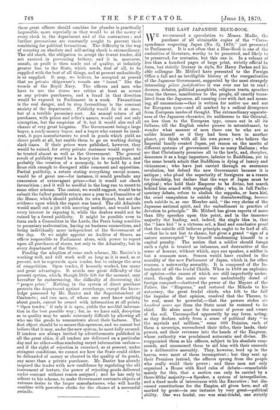MR. BAXTER AND HIS PURCHASES.
ATR. BAXTER should explain himself a little more fully, 1 for the public are still under a grave misapprehension as to the reform he has introduced into the Supply Depart- ment of the Admiralty. They believe, founding the belief on the basis of his own speeches, that he has abolished the system of contract to make way for the system of purchase, that he buys all he wants of the dealers just as a private individual would. Consequently, they consider that he has, with the best inten- tions, clutched a colossal amount of patronage, which he may use very well, but which his successor may misuse, and which ought not to be trusted to any individual. This objection to the "new system" has been strongly urged by the Times, the Spectator, and other journals not unfavourable to the Ministry, and is the foundation of most of the very personal attacks upon the Admiralty made during every debate in Supply ; but it is, we are told, based on a misconception, arising mainly from the Secretary's dislike to make his speeches too discursive. When Sir J. Elphinstone, or anyone else, attacks him, he answers the attack, when it might be more expedient to deliver an essay on the principle of his reform,—which is not a mere coup cr e'tat, but an effort to establish a most elaborate scheme for the preven- tion of jobbery and waste.
When Mr. Baxter came into office, he found no less than six departments of Supply, six offices, that is, spending among them in unequal proportions a million and a half a year. Each of these spending offices was more or less independent, had a system of its own, and was only just controlled by the Financial Secretary. Under these circumstances, it was extremely difficult to fix responsibility or impose adequate checks upon jobbery, that is, upon collusion between the market and the offices, the labour of control being multiplied just sixfold. Moreover, each department spending a sum comparatively small, the temptation to save was small too, that temptation being strongest when the sum saved is large enough to be appreciable in the Estimates. Mr. Baxter's first care was to consolidate these offices into a single "Purchase Department," under a single officer, the Superintendent of Contracts, who, being visible and responsible, can when needful be hanged. The next was not to supersede contract, as the public imagines ; but to supplement that scheme of purchase by allowing three alternative methods,—that is, direct purchase, purchase through a broker, and purchase by an unconscious competition among a few first-class firms, perhaps of all schemes the one which works best, and as yet the one upon which the department has mainly relied, the purchases by mere order, without examination of many separate proposals, having been extremely few. Of the whole amount spent, say, in round numbers, £1,500,000, more than two-thirds is still spent on goods selected by open competition, the Admiralty calling for tenders by advertisement, and the alternative powers being used chiefly to widen the circle of competition. Even where they are employed, they are employed under re- straints of a most elaborate kind. Mr. Baxter can no more tell a dealer in Dundee to send in .£10,000 worth of goods under his new system than he could before the reform was effected. He must have the co-operation of the Superintendent of Contracts, who, though a subordinate, is independently responsible; and of one Naval Lord, who is not under his orders ; and finally, if the matter is of any importance at all, of the First Lord, whose control is of the most direct and searching kind. Moreover, all particulars of the transaction, prices, names, and reasons, must be recorded in documents always at the disposal of the House. That all these great officers should combine for plunder is practically impossible, more especially as they would be at the mercy of every clerk in the department and of the contractors ; and further precautions are constantly sought to prevent their combining for political favouritism. The difficulty in the way of securing an absolute and self-acting check is extraordinary. The old check, the obligation to accept the lowest tender, did not succeed in preventing bribery, and it is, moreover, unsafe, as profit is then made out of quality, at infinitely greater loss to the State, which needs, first of all, to be supplied with the best of all things, and at present undoubtedly is so supplied. It may, we believe, be accepted as proved that no private shipowner's vessels are " found " like the vessels of the Royal Navy. The officers and men who have to use the stores are critics at least as severe as any private purchasers, and a fraud in that direction would be exposed in Parliament in a week. Favouritism is the real danger, and to stop favouritism is the constant anxiety of the department. Publicity would do it at once, but at a terrible pecuniary cost. An annual return of all purchases, with prices and seller's names, would end not only corruption, but the suspicion of it, but it would also end all chance of very great bargains. The Government being a large buyer, a ready-money buyer, and a buyer who cannot be insol- vent, it pays manufacturers to send in goods which yield no direct profit at all, but enable them to go on working during slack times. If their prices were published, however, they would be ruined, for every private customer would expect to be treated almost as well as the Government. The general result of publicity would be a heavy rise in expenditure, and probably the creation of a monopoly, to be held by a few firms rich enough to disregard alike comment and opposition. Partial publicity, a return stating everything except names, would be of great use—for instance, it would preclude any eoncession of extravagant prices—but it would not check favouritism ; and it will be needful in the long run to resort to some other scheme. The easiest, we would suggest, would be to submit the fullest possible return once a year to a Committee of the House, which should publish its own Report, but not the evidence upon which the report was based. The old Admirals would smell out a job with unerring instinct, and would have every interest in exposing it, while the dealers would not be ruined by a forced publicity. It might be possible even to form such a Committee in the Lords, the Peers being sensitive to pecuniary malversation, having no business connections, and being individually more independent of the Government of the day. Or we might appoint an Auditor of Stores, an officer responsible to Parliament alone, with power to report upon all purchases of stores, not only in the Admiralty, but in every department of the State.
Pending the adoption of some such scheme, Mr. Baxter's is working well, and will work well as long as it is used, as at present, not to supersede open tender, but to enlarge the area of competition. Open tender, if honestly worked, has many and great advantages. It avoids one great difficulty of the present system, which, though little felt for the moment, may hereafter be embarrassing, the difficulty of discovering the " propar price." Nothing in the system of direct purchase protects the department against overcharge, except the know- ledge possessed by Mr. Baxter and the Superintendent of Contracts ; and two men, of whom one need know nothing about goods, cannot be armed with information at all points. "Open tender," if only it is open, yields the needful informa- tion in the best possible way ; for, as we have said, deception as to quality may be made extremely difficult by allowing all who use the goods to remonstrate about their badness. The first object should be to secure this openness, and we cannot but believe that it may, under the new system, be most fully secured. If tenders are always invited by advertisements published in all the great cities, if all tenders are delivered on a particular day and no other—thus rendering secret information useless— and if the right of rejection is exercised, as at present, under stringent conditions, we cannot see how the State could either be defrauded of money or cheated in the quality of its goods, any more than a private purchaser. Mr. Baxter has already inspired the trades with new confidence by regulating the old instrument of torture, the power of rejecting goods delivered under contract without reason assigned ; and he has only to adhere to his scheme, to make Government contracts objects of extreme desire to the larger manufacturers, who will hardly combine with powerless clerks for the chance of a successful swindle. •































 Previous page
Previous page